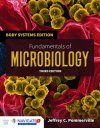About this book
Each new print copy includes Navigate 2 Advantage Access that unlocks a comprehensive and interactive eBook, student practice activities and assessments, a full suite of instructor resources, and learning analytics reporting tools. Ideal for health science and nursing students, Fundamentals of Microbiology: Body Systems Edition, Third Edition retains the engaging, student-friendly style and active learning approach for which award-winning author and educator Jeffrey Pommerville is known. Highly suitable for non-science majors, the fully revised and updated third edition of this bestselling text contains new pedagogical elements and an established learning design format that improves comprehension and retention and makes learning more enjoyable.
Unlike other texts in the field, Fundamentals of Microbiology: Body Systems Edition takes a global perspective on microbiology and infectious disease, and supports students in self-evaluation and concept absorption. Furthermore, it includes real-life examples to help students understand the significance of a concept and its application in today's world, whether to their local community or beyond. New information pertinent to nursing and health sciences has been added, while many figures and tables have been updated, revised, and/or reorganized for clarity.
Comprehensive yet accessible, Fundamentals of Microbiology: Body Systems Edition, Third Edition is an essential text for non-science majors in health science and nursing programs taking an introductory microbiology course. With Navigate 2, technology and content combine to expand the reach of your classroom. Whether you teach an online, hybrid, or traditional classroom-based course, Navigate 2 delivers unbeatable value.
Please note: the standard Fundamentals of Microbiology is also available.
Contents
Part 1 Foundations of Microbiology
Chapter 1 Microbiology: Then and Now
Chapter 2 The Chemical Building Blocks of Life
Chapter 3 Concepts and Tools for Studying Microorganisms
Chapter 4 Cell Structure and Function in the Bacteria and Archaea
Chapter 5 Microbial Growth and Nutrition
Chapter 6 Metabolism of Microorganisms
Part 2 The Genetics of Microorganisms
Chapter 7 Microbial Genetics
Chapter 8 Gene Transfer, Genetic Engineering, and Genomics
Part 3 The Control of Microorganisms
Chapter 9 Control of Microorganisms: Physical and Chemical Methods
Chapter 10 Antimicrobial Drugs
Part 4 A Survey of the Microbial World
Chapter 11 Microbial Systematics and the Domains Bacteria and Archaea
Chapter 12 Eukaryotic Microorganisms: The Protists, Fungi, and Helminths
Chapter 13 The Viruses and Virus-Like Agents
Part 5 Interactions and Impact of Microorganisms with Humans
Chapter 14 Infection and Disease
Chapter 15 Resistance and the Immune System: Innate Immunity
Chapter 16 Resistance and the Immune System: Acquired Immunity
Chapter 17 Immunity and Serology
Chapter 18 Immune Disorders and AIDS
Part 6 Infectious Diseases of Humans
Chapter 19 Infectious Diseases Affecting the Skin and Eyes
Chapter 20 Infectious Diseases Affecting the Respiratory System
Chapter 21 Infectious Diseases Affecting the Digestive System
Chapter 22 Infectious Diseases Affecting the Nervous System
Chapter 23 Cardiovascular, Lymphatic, and Systemic Infectious Diseases
Chapter 24 Infectious Diseases Affecting the Urinary and Reproductive Systems
Chapter 25 Applied and Industrial Microbiology (Available online only)
Chapter 26 Environmental Microbiology (Available online only)
Customer Reviews
Biography
Jeffrey Pommerville has a Ph.D. in Cell and Organismal Biology from the University of California, Santa Barbara. After serving as a Postdoctoral Research Fellow at the University of Georgia, he was an assistant professor of biology at Texas A&M University. For the past 14 years, he has been Professor of Biology at Glendale Community College where he teaches introductory biology and microbiology. He has 20 years of research experience in cell biology and microbiology and has authored over 35 peer-reviewed papers in national and international research journals. For the past three years, he was the principal investigator for Systemic Reform In Science (SyRIS), a project funded by the National Science Foundation that was designed to improve student outcomes in science through changes in curriculum and pedagogy that align with national systemic reform initiatives. In 2003, he was awarded the Gustav Ohaus Award (College Division) for Innovations in Science Teaching from the National Science Teachers Association. Over the past three years, he has presented numerous seminars and workshops to colleges, universities, business, medical, and service organizations on understanding and responding to bioterrorism.



























